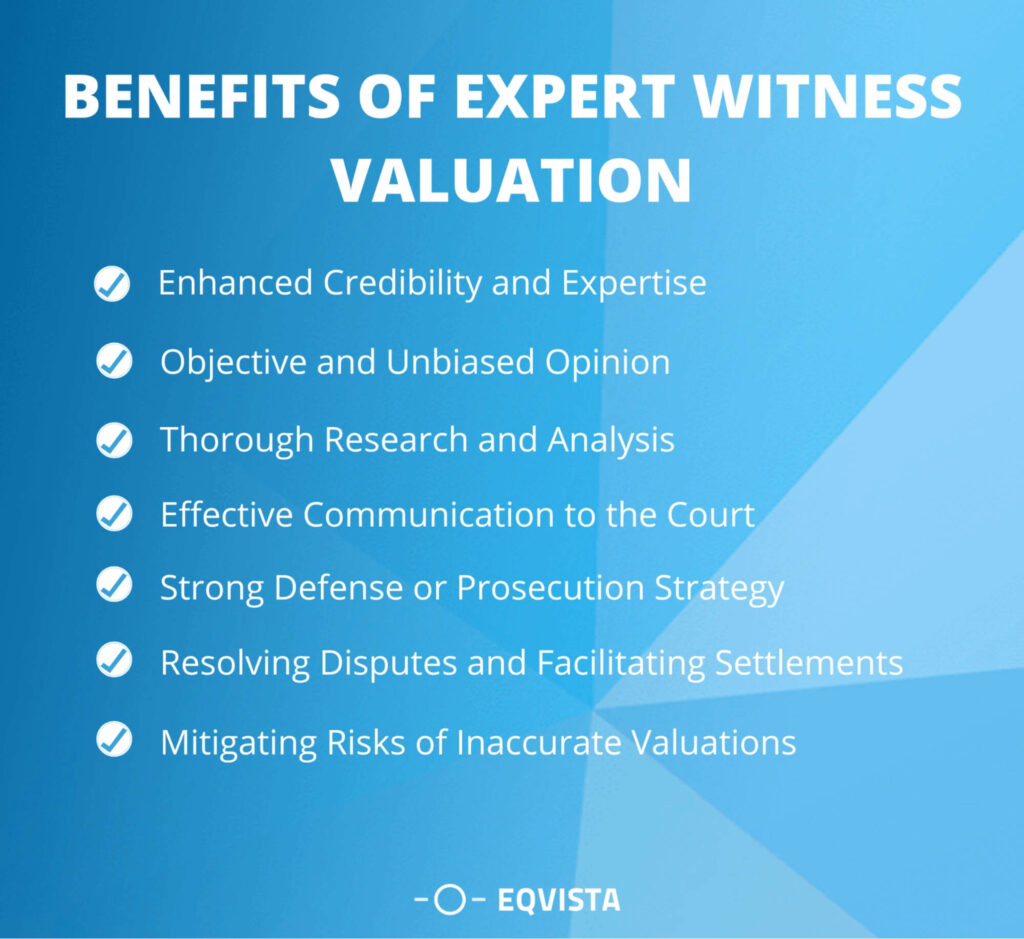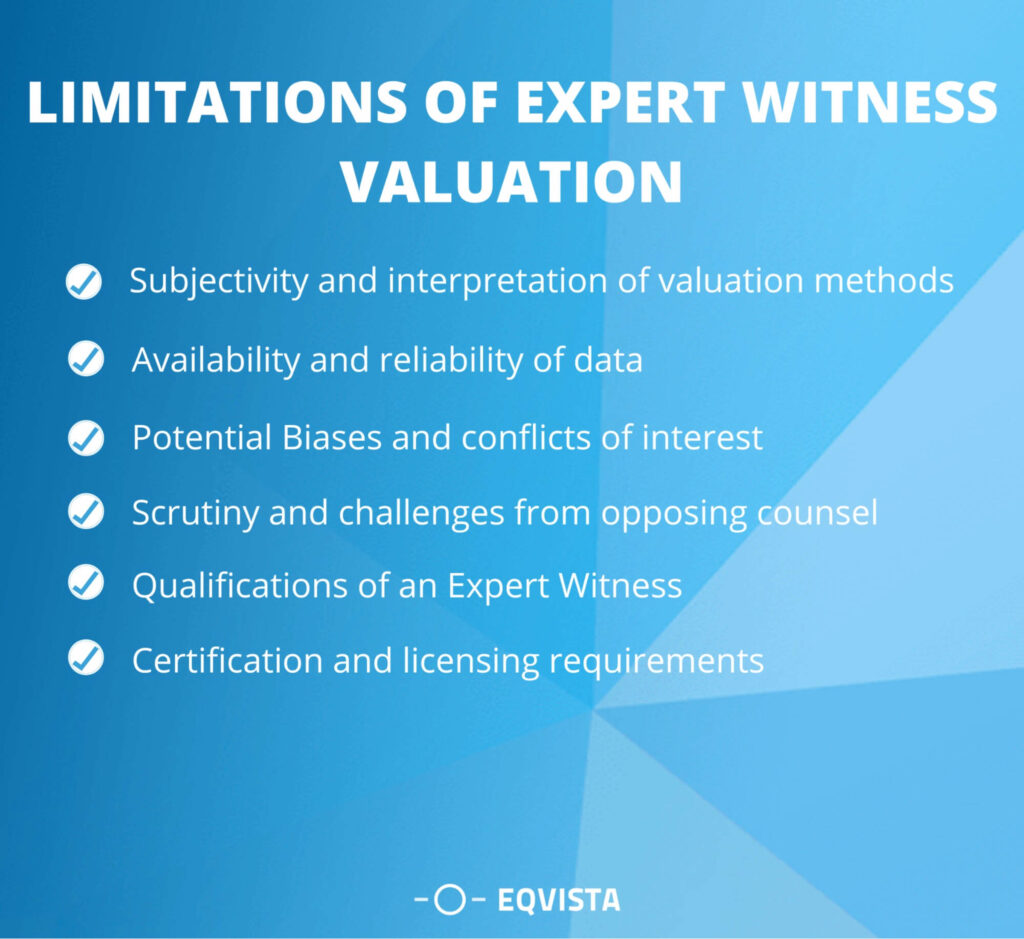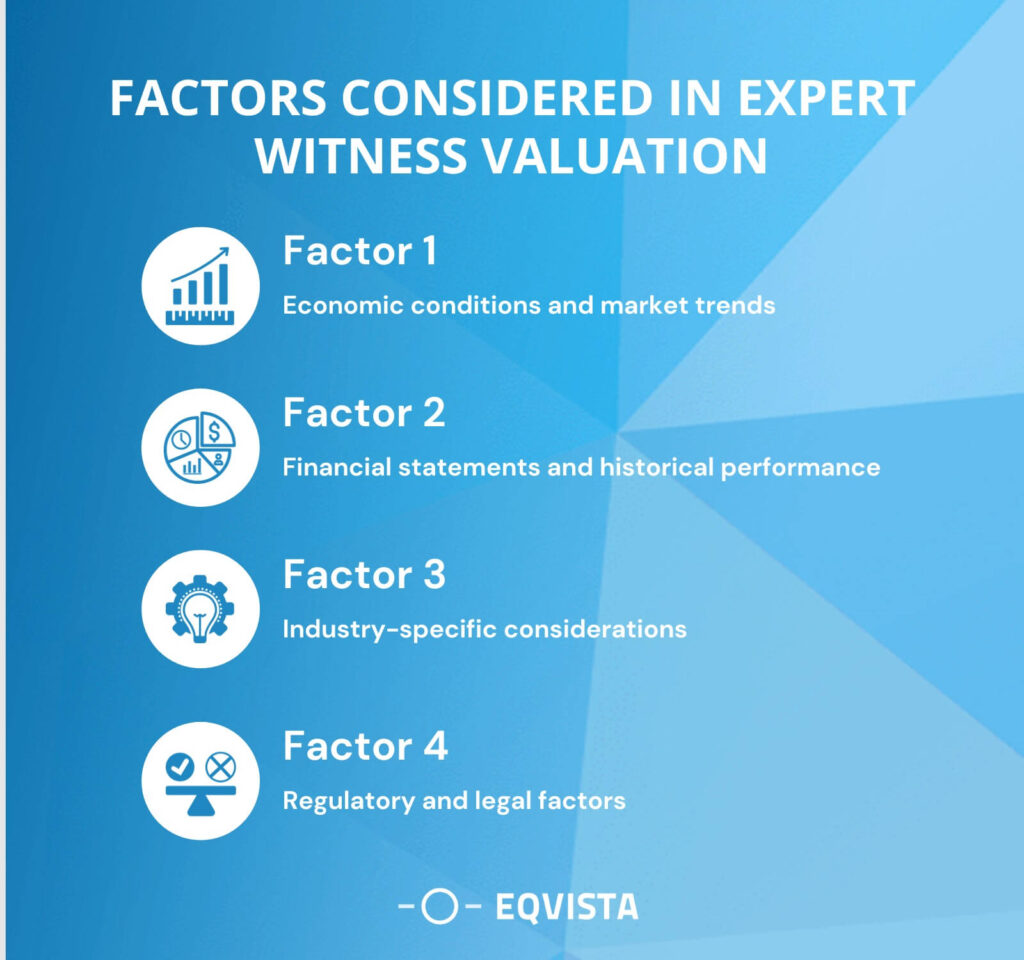Expert Witness Valuation: What You Need to Know
This article highlights the Valuation Methods Used by Expert Witnesses, Qualifications of an Expert Witness, and Factors Considered in Expert Witness Valuation.
Expert witness valuation is critical in business disputes and other cases where assessing the value of a corporation is required. To determine a business’s value according to professional standards, one needs specific knowledge, experience, and credentials in business valuation. A company’s worth is essentially an estimate of the future profits the owner anticipates bringing in, making it fundamentally speculative and subject to forecasts.
Expert witness valuation
Expert witness valuation is the process of determining the value of a business or property by an expert witness in a legal environment. An expert witness is a specialist who is asked to offer their opinion and analysis to the court or parties engaged in a legal dispute. They typically have specialized knowledge and expertise in a certain sector, such as company appraisal or real estate assessment. The expert witness’s job is to offer an unbiased and independent evaluation of the value based on their knowledge and pertinent data.
What is expert witness valuation?
An expert witness valuation is a business valuation conducted in accordance with legal specifications using commonly recognized scientific techniques by a person having the relevant skills to carry out such a computation.
Such Valuations are important for financial reporting, tax matters, and litigation related to business valuation. They are necessary to get a loan, be acquired, plan your estate, transfer ownership interest, and resolve disputes.
Benefits of expert witness valuation
Expert witnesses have specific expertise, education, and experience in valuation domains, which improves their credibility and allows them to offer trustworthy assessments of property value, which is essential for both court and negotiating credibility.
The following are some advantages of using an expert witness for valuation purposes.

- Enhanced Credibility and Expertise – Expert witnesses in the valuation industry must have increased credibility and expertise. When serving as an expert witness, it is critical to establish credibility and display knowledge in order to convince jurors and provide useful insights into legal proceedings. Jurors’ perceptions of expert witnesses are heavily influenced by their credibility. Research has revealed that when analyzing testimony, jurors frequently rely more on their impression of the expert than the expert’s actual opinion.
- Objective and Unbiased Opinion – A fair and well-informed decision in a judicial proceeding depends on an objective and unbiased expert witness valuation opinion. Expert witnesses are essential in assisting fact-finders, such as judges or juries, in comprehending complicated topics that are outside of their areas of expertise by providing specialized information and opinions. Expert witnesses offer insightful opinions, but the fact finder is ultimately responsible for weighing and assessing the expert witnesses’ testimony.
- Thorough Research and Analysis – Expert witness valuation requires extensive research and analysis to establish credibility and trustworthiness. This entails acquiring data, employing proper valuation methods, taking due consideration of financial and economic concepts, and utilizing the knowledge of professionals. Legal requirements and jurisdictional standards must be followed in research and analysis.
- Effective Communication to the Court – Effective communication with the court in expert witness valuation is critical for providing complex facts in a straightforward and understandable manner. Expert witnesses must not only have technical expertise in their subject, but also strong communication skills in order to successfully communicate their analyses and results.
- Strong Defense or Prosecution Strategy – A strong defense or prosecution strategy in expert witness valuation should take numerous crucial elements into account. Early expert witness retention is essential for case strategy as they can evaluate the value, construct claims, write requests for discovery, and develop a case strategy. Selecting an expert witness necessitates a careful examination of qualifications, experience, and prior reports to ensure substantial expertise and conflict-free testimony. The evaluation of a witness is greatly influenced by expert reports, which include thorough opinions, facts, and proof.
- Resolving Disputes and Facilitating Settlements – Resolving disputes and enabling settlements in expert witness valuation is critical in judicial proceedings involving valuation conflicts. Experts in valuation have a more active part in the resolution of disputes when they are involved in legal proceedings than just offering expert testimony.
- Mitigating Risks of Inaccurate Valuations – To reduce erroneous valuations in expert witness valuation, follow recommended practices such as adhering to International Standards, identifying value uncertainty, and rigorous data gathering. Expert witnesses possess industry knowledge, market dynamics, and valuation methodology, ensuring accurate values and dependable findings. These practices enhance credibility and provide reliable opinions aligned with professional standards.
Limitations of expert witness valuation
Expert witness valuation has some restrictions that should be taken into account, just like any other type of expert testimony. The following are some restrictions on expert witness valuation.

- Subjectivity and interpretation of valuation methods – Expert witness valuation entails using professional judgment and skill to determine the worth of assets, enterprises, or other relevant elements. These evaluations, however, could be subjective because various experts might have different perspectives and value techniques. The valuation process may become variable and perhaps biased as a result of this subjectivity.
- Availability and reliability of data – Data availability and quality have a significant impact on the accuracy and dependability of expert witness value. Experts could have trouble finding pertinent information or dealing with constraints in the data that is given to them. In some circumstances, the data may be inadequate, out of date, or biased, affecting the valuation’s accuracy.
- Potential Biases and conflicts of interest – Expert witness evaluation might suffer significantly from potential biases and conflicts of interest. These restrictions may have an adverse effect on the objectivity and dependability of expert testimony, potentially compromising the fairness of court proceedings. To preserve the credibility of expert testimony and guarantee fair outcomes in judicial procedures, it is crucial to acknowledge and resolve these limits.
- Scrutiny and challenges from opposing counsel – Examination and objections from opposing counsel may restrict the value of an expert witness. The close examination by the opposing counsel seeks to find any weaknesses in the expert’s report and evidence. The expert’s resume is frequently examined by the opposing attorney to look for any errors or discrepancies. It’s essential to make sure the data on your resume is accurate and up to date.
- Qualifications of an Expert Witness – Expert witness qualifications typically include competence, experience, and the capacity to provide specific knowledge pertinent to a given topic or discipline in a legal case. Based on the details provided, the following is a list of an expert witness’s qualifications.
- Certification and licensing requirements – Expert witness certification and licensing standards differ depending on jurisdiction and field of expertise. The standards for expert witnesses in the United States are normally determined by the evidentiary rules in the specific federal or state court where the testimony is being presented. Rule 702 of the Federal Rules of Evidence is one pertinent rule. In federal courts, Rule 702 specifies the requirements for expert testimony admissibility.
Roles and Responsibilities of an Expert Witness
Expert witnesses are required to do a wide range of tasks, including analyzing cases, generating claims, writing documents, assessing evidence, debating rival experts, creating case strategies, estimating damages, and testifying in court.
- Providing an unbiased and independent opinion
- Conducting thorough research and analysis
- Preparing and presenting expert reports
- Testifying in court and cross-examination
Providing an unbiased and independent opinion
To retain credibility and integrity in judicial procedures, expert witness value necessitates an unbiased and independent view. An expert witness’s perceived bias can be detrimental to their neutrality and may have an effect on how the case turns out. To maintain the legitimacy and integrity of the legal system, expert witness valuation must continue to be conducted with objectivity and independence.
Conducting thorough research and analysis
Conducting extensive research and analysis is a critical duty and responsibility of an expert witness. It entails compiling pertinent data, analyzing it, and formulating professional opinions based on validated techniques. When conducting expert research, it is critical to explore a variety of sources of information that might provide insight into an expert’s qualifications, experience, and credibility. Expert witnesses can offer trustworthy and knowledgeable opinions that help resolve legal issues by undertaking in-depth study and analysis.
Preparing and presenting expert reports
Following a systematic method while creating and delivering expert reports in expert valuation helps to assure the accuracy and legitimacy of the valuation process. Here is a detailed manual on how to draft and deliver professional value reports.
- Recognize the Goal
- Set the Goals
- Obtain Useful Information
- Select the Best Valuation Method and Use Valuation Methods
- Execute a valuation analysis
- Record the results, then examine and confirm them.
- Display the Expert Report.
Testifying in court and cross-examination
In valuation cases, testifying in court and cross-examining an expert witness can be a complicated process. Attorneys can still improve their odds of victory by using effective techniques and preparation. It is essential to devise a solid strategy that avoids directly disputing the expert’s knowledge in their area of specialty when cross-examining a witness in a valuation case. Instead, you might use alternative ways that have a lesser chance of danger and greater potential for return.
Valuation Methods Used by Expert Witnesses
The specific context and aim of the valuation will influence the valuation techniques utilized by expert witnesses. These techniques are used by expert witnesses, such as financial analysts, economists, or appraisers, to offer an assessment of the worth of a property, a company, or another issue in court. These techniques might involve the following.
Market approach: Comparing similar assets or transactions
The subject asset is compared to comparable assets that have recently been sold or otherwise traded in the market in order to establish its worth using this method. The expert witness examines market information, such as similar sales, purchases, or listings, to determine the fair market value.
Income approach: Assessing future income potential and risks
The income approach calculates value based on the revenue produced by the asset or business. It entails calculating the present value of the projected benefits by analyzing future income streams, cash flows, and potential risks. This strategy may employ techniques like capitalization of profits or discounted cash flow analysis (DCF).
Cost approach: Evaluating replacement or reproduction costs
The cost approach evaluates the cost to duplicate or replace the subject asset to determine its value. To assess the worth, it considers the cost of acquiring or developing comparable assets, adjusted for depreciation or obsolescence.
Factors Considered in Expert Witness Valuation
The factors considered in expert witness value differ based on the specific case and the nature of the skill sought. These elements are crucial for confirming the expert’s credentials, credibility, communication skills, and applicability to the situation at hand.

- Economic conditions and market trends – Expert witness valuation uses economic factors and market trends to calculate asset worth and quantify economic damages. They examine factors like GDP growth, inflation, interest rates, employment data, consumer spending patterns, and industry-specific indicators using quantitative analysis, industry expertise, and economic forecasting. They gain a better understanding of the broader economic situation and how it affects the assessment of assets and the calculation of damages.
- Financial statements and historical performance – An expert witness evaluates a company’s financial health and performance using financial statements and past performance. These statements reveal information about assets, liabilities, revenues, costs, and cash flows, determining value. Assessing past performance helps determine revenue generation, cost control, and value creation for shareholders, impacting present and future valuation.
- Industry-specific considerations – Industry-specific factors significantly impact the value of an expert witness. To determine the value of an expert witness, various industry-specific criteria must be considered. The nature of the case and the sector may influence the valuation, making it essential to examine both industry-specific criteria and the expert witness’s knowledge and credentials for an accurate and fair assessment.
- Regulatory and legal factors – Expert witness valuation is heavily influenced by regulatory and legal concerns. Attorneys should carefully consider the regulatory and legal aspects before retaining an expert witness for valuation in a lawsuit to make sure the expert’s findings and valuation report can be defended and help build a compelling case.
The Role of Expert Witness Valuation in Legal Proceedings
The role of expert witness valuation in judicial procedures is broad and involves several critical factors. Expert witnesses play an important role in assisting the court or tribunal in grasping difficult issues and making informed conclusions.
| Legal Proceeding | Type | Role Of Expert Witness |
|---|---|---|
| Civil litigation | Personal injury, breach of contract, divorce, etc. | They are asked to assist the court or tribunal with their professional opinions and knowledge on disputed issues. |
| Criminal cases | Asset forfeiture, fraud investigations, etc. | Experts are chosen based on qualifications, conflicts of interest, and prior difficulties: reports and testimony aid understanding of financial issues. |
| Arbitration and mediation | Resolving disputes outside of court | They evaluate technical evidence, assess damages, and provide settlement conclusions while navigating time restrictions and arbitrator questioning. |
Eqvista, your trusted ally, stands by your side to navigate the complexities
In court trials, expert witnesses offer insightful knowledge and viewpoints that are helpful for developing strategies and comprehending difficult problems. Expert witnesses in valuation determine asset and property values, which is significant in disputes over valuation.
The business valuation services offered by Eqvista are customized to meet your unique requirements and come with full customer support from NACVA-certified analysts. The appraisal procedure is straightforward and carried out quickly and competently. Get in touch with us directly for further information.
Interested in issuing & managing shares?
If you want to start issuing and managing shares, Try out our Eqvista App, it is free and all online!
